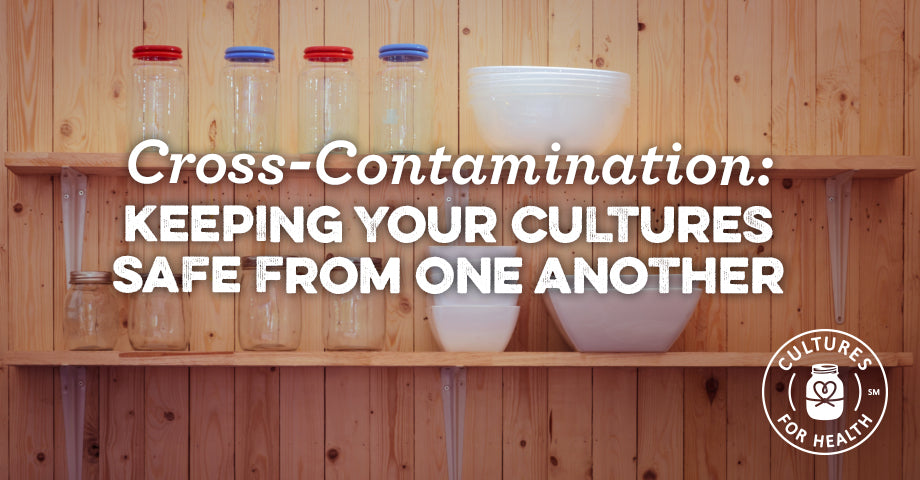
The term cross-contamination refers to the problems caused by the transfer of bacteria between fermenting foods. Outside bacteria may also come from hands, countertops, utensils or other sources.
Foreign bacteria can cause unpleasant flavors or aromas and can even damage cultures. While cross-contamination is not a common occurrence, we recommend playing it safe by using best practices with each batch of fermenting foods.
HOW CROSS-CONTAMINATION HAPPENS
Cross contamination can happen in any kitchen, no matter how clean. Common problems that result in cross contamination are:
- Improperly cleaned or rinsed jars and utensils used for fermenting.
- Unclean hands used for chopping or stuffing jars with fruit or vegetables to be fermented.
- Wooden utensils’ retaining bacteria from earlier projects.
- Keeping two different types of culturing or fermenting foods too close together during the fermentation period, causing airborne cross-contamination.
- Keeping fermenting projects too close to other sources of ambient bacteria.
HOW TO PREVENT CROSS-CONTAMINATION
Here are some tips and easy steps you can take to prevent cross-contamination in your kitchen:
- Keep different culturing foods away from each other. Keeping a distance of 4 feet between different cultures should be sufficient to avoid any problems.
- Keep tools and workspace clean, and rinse everything thoroughly with plain water to remove any soap or chemical cleaner residue.
- Avoid anti-bacterial soaps and detergents.
- Do not allow pets in your kitchen while making cheese or starting a culture or ferment.
- Keep countertops free of clutter and things that can be easily spilled.
- Keep culturing foods away from other bacteria sources, such as a garbage or compost pail, sink drain, even soiled laundry!
- Avoid culturing in areas with other chemical products in use, such as a laundry room.
SPECIAL CONSIDERATIONS FOR SOME CULTURES
Note that some culturing projects are more sensitive to cross-contamination and require higher levels of sanitation or sterilizing. Making natto, tempeh, or cheese may have further requirements. Always read instructions thoroughly before beginning a new culturing project.
Not sure what sanitization steps are appropriate for your next culturing venture? Contact us for assistance.















